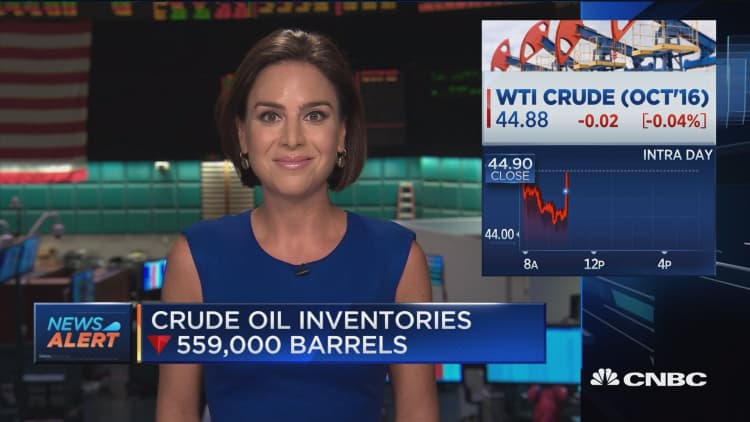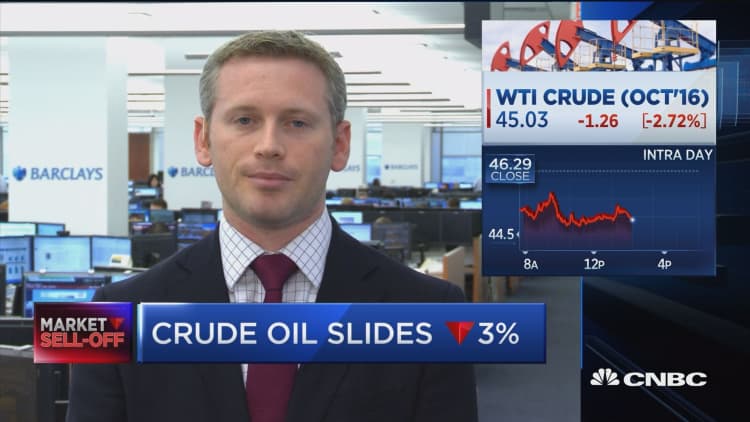Oil prices fell about 2 percent on Wednesday as data showing large weekly builds in U.S. petroleum products offset a surprise draw in crude stockpiles.
The U.S. Energy Information Administration reported that crude inventories fell 559,000 barrels during the week ended Sept. 9. Analysts had expected a build of 3.8 million barrels.
But the EIA also reported that inventories of distillates, which include diesel and heating oil, rose by 4.6 million barrels in the week to Sept. 9, versus analysts' expectations of an increase of 1.5 million barrels. That build weighed on broader market sentiment, forcing crude futures to reverse gains.
Gasoline stocks rose by 567,000 barrels, compared with analysts' expectations in a Reuters poll for a 343,000-barrel gain.
"A build to gasoline stocks amid lower runs and lower product supplied counters the bullish theme, as does a strong build to distillates," said Matthew Smith, analyst at New York-based crude cargo tracker Clipperdata. "So, it's a mixed report - bullish crude and bearish products."

Brent crude futures were down 92 cents, or 2 percent, at 46.18 per barrel at 1:44 p.m. ET (1744 GMT). U.S. West Texas Intermediate futures future fell 93 cents, or 2.1 percent, to $43.97 a barrel.
Both Brent and WTI rose briefly after the EIA reported the latest crude drawdown, which followed the previous week's surprise decline of 14.5 million barrels. That earlier draw, the most for a week since 1999, was due to Tropical Storm Hermine delaying oil arrivals into the U.S. Gulf Coast for several days.
"So, the million-dollar question is really a 14.5 million barrel question ... as in where did all those barrels go to? The market was expecting some sort of a 'make up call' after last week's storm affected mega-draw," said David Thompson, executive vice president at commodities-focused broker Powerhouse in Washington.
Some said the next EIA data could shed light on that. "Next week's report will be telling, whether last week's lost barrels finally show up in the petroleum balance sheet," said John Kilduff, partner at New York energy hedge fund Again Capital.
Gasoline and distillate futures fell more than 2 percent each. Distillates also hit a two-week low as investors worried whether the coming autumn will be cold enough to boost heating oil demand adequately.
"The big rise in distillate inventories should weigh, as the category assumes the mantle of seasonal leadership," Kilduff added.



On Tuesday, crude futures settled down 3 percent after the world's energy watchdog and OPEC both revised forecasts that signaled the global crude glut could persist much longer than expected.
The Organization of the Petroleum Exporting Countries pointed to a larger surplus next year due to new fields in non-member countries. U.S. shale drillers are proving more resilient than expected to cheap crude, OPEC added.
Commerzbank said in a note that the delay in rebalancing is largely due to a rise in production from OPEC members of the and that the market would be balanced already if OPEC had maintained its production at May's levels.
"Rather than talking about capping oil production as it was planning to do at the end of September, OPEC would be better advised to think about reversing the production growth of recent months," Commerzbank analyst Carsten Fritsch said.
OPEC is expected to meet with non-members led by Russia at an industry conference in Algeria on Sept. 26-28 to discuss a crude production freeze. Few analysts believe the two sides will reach a deal.

